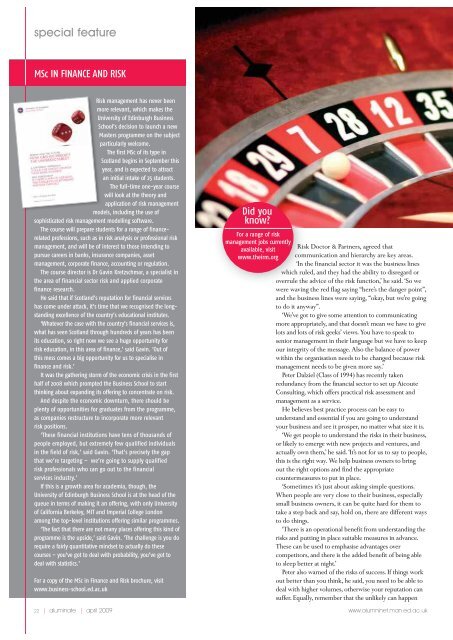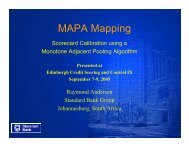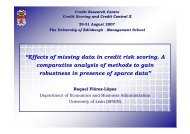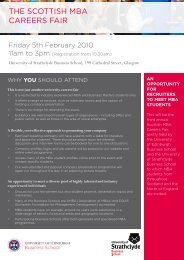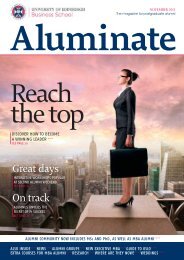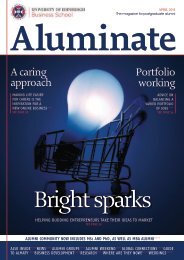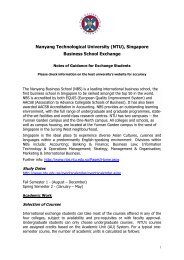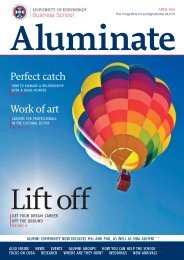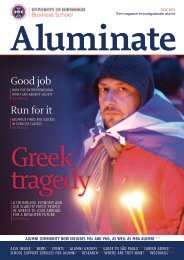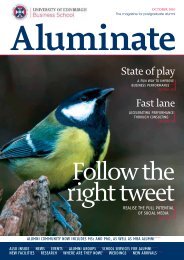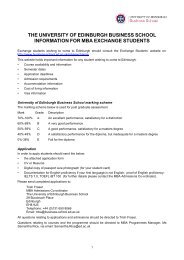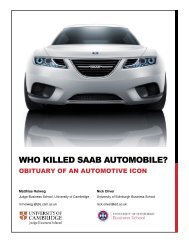to thewind? Caution - University of Edinburgh Business School
to thewind? Caution - University of Edinburgh Business School
to thewind? Caution - University of Edinburgh Business School
You also want an ePaper? Increase the reach of your titles
YUMPU automatically turns print PDFs into web optimized ePapers that Google loves.
special featurespecial featureMSc IN FINANCE AND RISKDEALING WITH THE UNEXPECTEDRisk management has never beenmore relevant, which makes the<strong>University</strong> <strong>of</strong> <strong>Edinburgh</strong> <strong>Business</strong><strong>School</strong>’s decision <strong>to</strong> launch a newMasters programme on the subjectparticularly welcome.The first MSc <strong>of</strong> its type inScotland begins in September thisyear, and is expected <strong>to</strong> attractan initial intake <strong>of</strong> 25 students.The full-time one-year coursewill look at the theory andapplication <strong>of</strong> risk managementmodels, including the use <strong>of</strong>sophisticated risk management modelling s<strong>of</strong>tware.The course will prepare students for a range <strong>of</strong> financerelatedpr<strong>of</strong>essions, such as in risk analysis or pr<strong>of</strong>essional riskmanagement, and will be <strong>of</strong> interest <strong>to</strong> those intending <strong>to</strong>pursue careers in banks, insurance companies, assetmanagement, corporate finance, accounting or regulation.The course direc<strong>to</strong>r is Dr Gavin Kretzschmar, a specialist inthe area <strong>of</strong> financial sec<strong>to</strong>r risk and applied corporatefinance research.He said that if Scotland’s reputation for financial serviceshas come under attack, it’s time that we recognised the longstandingexcellence <strong>of</strong> the country’s educational institutes.‘Whatever the case with the country’s financial services is,what has seen Scotland through hundreds <strong>of</strong> years has beenits education, so right now we see a huge opportunity forrisk education, in this area <strong>of</strong> finance,’ said Gavin. ‘Out <strong>of</strong>this mess comes a big opportunity for us <strong>to</strong> specialise infinance and risk.’It was the gathering s<strong>to</strong>rm <strong>of</strong> the economic crisis in the firsthalf <strong>of</strong> 2008 which prompted the <strong>Business</strong> <strong>School</strong> <strong>to</strong> startthinking about expanding its <strong>of</strong>fering <strong>to</strong> concentrate on risk.And despite the economic downturn, there should beplenty <strong>of</strong> opportunities for graduates from the programme,as companies restructure <strong>to</strong> incorporate more relevantrisk positions.‘These financial institutions have tens <strong>of</strong> thousands <strong>of</strong>people employed, but extremely few qualified individualsin the field <strong>of</strong> risk,’ said Gavin. ‘That’s precisely the gapthat we’re targeting – we’re going <strong>to</strong> supply qualifiedrisk pr<strong>of</strong>essionals who can go out <strong>to</strong> the financialservices industry.’If this is a growth area for academia, though, the<strong>University</strong> <strong>of</strong> <strong>Edinburgh</strong> <strong>Business</strong> <strong>School</strong> is at the head <strong>of</strong> thequeue in terms <strong>of</strong> making it an <strong>of</strong>fering, with only <strong>University</strong><strong>of</strong> California Berkeley, MIT and Imperial College Londonamong the <strong>to</strong>p-level institutions <strong>of</strong>fering similar programmes.‘The fact that there are not many places <strong>of</strong>fering this kind <strong>of</strong>programme is the upside,’ said Gavin. ‘The challenge is you dorequire a fairly quantitative mindset <strong>to</strong> actually do thesecourses – you’ve got <strong>to</strong> deal with probability, you’ve got <strong>to</strong>deal with statistics.’For a copy <strong>of</strong> the MSc in Finance and Risk brochure, visitwww.business-school.ed.ac.ukDid youknow?For a range <strong>of</strong> riskmanagement jobs currentlyavailable, visitRisk Doc<strong>to</strong>r & Partners, agreed thatwww.theirm.org communication and hierarchy are key areas.‘In the financial sec<strong>to</strong>r it was the business lineswhich ruled, and they had the ability <strong>to</strong> disregard oroverrule the advice <strong>of</strong> the risk function,’ he said. ‘So wewere waving the red flag saying “here’s the danger point”,and the business lines were saying, “okay, but we’re going<strong>to</strong> do it anyway”.‘We’ve got <strong>to</strong> give some attention <strong>to</strong> communicatingmore appropriately, and that doesn’t mean we have <strong>to</strong> givelots and lots <strong>of</strong> risk geeks’ views. You have <strong>to</strong> speak <strong>to</strong>senior management in their language but we have <strong>to</strong> keepour integrity <strong>of</strong> the message. Also the balance <strong>of</strong> powerwithin the organisation needs <strong>to</strong> be changed because riskmanagement needs <strong>to</strong> be given more say.’Peter Dalziel (Class <strong>of</strong> 1994) has recently takenredundancy from the financial sec<strong>to</strong>r <strong>to</strong> set up AicouteConsulting, which <strong>of</strong>fers practical risk assessment andmanagement as a service.He believes best practice process can be easy <strong>to</strong>understand and essential if you are going <strong>to</strong> understandyour business and see it prosper, no matter what size it is.‘We get people <strong>to</strong> understand the risks in their business,or likely <strong>to</strong> emerge with new projects and ventures, andactually own them,’ he said. ‘It’s not for us <strong>to</strong> say <strong>to</strong> people,this is the right way. We help business owners <strong>to</strong> bringout the right options and find the appropriatecountermeasures <strong>to</strong> put in place.‘Sometimes it’s just about asking simple questions.When people are very close <strong>to</strong> their business, especiallysmall business owners, it can be quite hard for them <strong>to</strong>take a step back and say, hold on, there are different ways<strong>to</strong> do things.‘There is an operational benefit from understanding therisks and putting in place suitable measures in advance.These can be used <strong>to</strong> emphasise advantages overcompeti<strong>to</strong>rs, and there is the added benefit <strong>of</strong> being able<strong>to</strong> sleep better at night.’Peter also warned <strong>of</strong> the risks <strong>of</strong> success. If things workout better than you think, he said, you need <strong>to</strong> be able <strong>to</strong>deal with higher volumes, otherwise your reputation cansuffer. Equally, remember that the unlikely can happen‘REMEMBER THATTHE UNLIKELY CANHAPPEN AND IF ITIS CATASTROPHICYOU NEED TO BEABLE TO LIVEWITH IT, NOMATTER HOWUNLIKELY IT IS’Peter DalzielLike a gamble on the roulette table,taking a business risk can be a goodopportunity, if managed appropriatelyand if it is catastrophic, you need <strong>to</strong> live with it, no matterhow unlikely it is.As Lord Turner, the head <strong>of</strong> the Financial ServicesAuthority, noted recently: ‘One in a thousand year eventsseem <strong>to</strong> be happening annually, and one in a hundred yearevents are occurring weekly at the moment. All our riskmodels need <strong>to</strong> be reviewed, updated and re-applied.’One <strong>of</strong> the key areas for companies <strong>to</strong> consider is instress-testing, <strong>to</strong> determine how robust their businessmodel is. At a recent seminar looking at risk andcorporate governance, Frank Blin, Senior Partner inScotland with accounting firm PricewaterhouseCoopers,said: ‘Every board must be looking at risk managementand risk assessment. They will need <strong>to</strong> “stress test”assumptions and look at how the business can deal withscenarios that a few months ago seemed unimaginablypessimistic or even completely unrealistic.’At the same meeting, Norman Murray, Chairman <strong>of</strong>Cairn Energy, said: ‘<strong>Business</strong> risks have changedsignificantly in the past six months and there’s no hopingthey will go away. The big risks facing the company need<strong>to</strong> be out on the table. Risk should be the number oneitem on the board’s agenda.’The fear for industry is that events <strong>of</strong> the past yearcould lead <strong>to</strong> a re-think in regulations when it comes <strong>to</strong>risk and corporate governance. The Financial ReportingCouncil has already announced a review <strong>to</strong> its CombinedCode on Corporate Governance, which sets out bestpractice corporate governance standards for UK-listedcompanies. One <strong>of</strong> the specific areas being looked at iswith the board’s relation <strong>to</strong> risk management.Ultimately, said Dr David Hillson, risk should be seenas creating positive opportunities, when it is managedappropriately. There was a view <strong>of</strong> the risk managementpr<strong>of</strong>ession as the ‘business prevention department’,because they were saying ‘you can’t do that’, he said.‘I think it’s important <strong>to</strong> view risk as an opportunity, arisk representing a positive chance. The future is uncertainbut risk in future possibilities is linked <strong>to</strong> innovation,creativity and competitive advantage.’Just as long as you’re trying <strong>to</strong> know as much as you canabout the unknown unknowns.The study <strong>of</strong> statistics and the use <strong>of</strong> sophisticated modellings<strong>of</strong>tware can tell us a great deal about risk and how we canpredict what may happen in the future, based on a detailedunderstanding <strong>of</strong> what has already gone before.But how do you account for the truly unexpected?That’s the subject <strong>of</strong> Nassim Nicholas Taleb’s 2007 book,‘The Black Swan: the impact <strong>of</strong> the highly improbable’. Thetitle comes from the discovery <strong>of</strong> black swans in Australia inthe 17th century, which destroyed the prevailing assumptionheld up until then that all swans were white.Taleb wrote, prior <strong>to</strong> the collapse <strong>of</strong> the bankingsystem, that the financial services industry was vulnerable<strong>to</strong> unanticipated ‘black swan’ events, and companieswere exposed <strong>to</strong> losses beyond anything predicted bytheir risk managers.He has criticised widely used measures in the riskmanagement industry such as Value at Risk as giving traders afalse sense <strong>of</strong> confidence in their transactions.His study <strong>of</strong> the impact <strong>of</strong> unforeseen events is beingtaken on board by the risk management industry, saidCarolyn Williams, Development Manager at the Institute <strong>of</strong>Risk Management.‘Stress testing scenario analysis is something that I thinkwe’re going <strong>to</strong> see a lot more <strong>of</strong>, because we’re seeing somany “black swans” flying around,’ she said.‘Taleb has a focused way <strong>of</strong> dealing with the unexpected,in his case by putting money in<strong>to</strong> a fund every year <strong>to</strong> dealwith unanticipated situations. Translating that in<strong>to</strong> corporateterms isn’t as easy as it sounds, but we need <strong>to</strong> develop new<strong>to</strong>ols and techniques for dealing with that sort <strong>of</strong> uncertainty– and accepting that it can happen.’One <strong>of</strong> the key messages from The Black Swan is that <strong>to</strong>manage risk and uncertainty, you have <strong>to</strong>look beyond the statistics and the mathematics.Taleb’s example is <strong>of</strong> two characters, Brooklyn-bornwiseguy Fat Tony and the former engineer Dr John, who’snow an actuary for an insurance company, where he runscomputer programmes in risk management.The scenario is that you <strong>to</strong>ss a coin 99 times and it comesup heads every single time. So what are the chances <strong>of</strong> itcoming up tails for the 100th <strong>to</strong>ss?Dr John dismisses it as a trivial question, and logically saysthat there’s a 50 per cent chance <strong>of</strong> the coin coming up tailsthe next time.Fat Tony says the chances are one per cent. ‘You are eitherfull <strong>of</strong> crap or a puresucker <strong>to</strong> buy that 50per cent business,’ hesaid. ‘The coin gotta beloaded. It can’t be afair game.’Taleb also imaginesTony whispering in hisear: ‘I know these guyswith nerd examples fromthe bank days. They thinkway <strong>to</strong>o slow. And they are<strong>to</strong>o commoditised.’22 | aluminate | april 2009 www.alumninet.man.ed.ac.ukwww.alumninet.man.ed.ac.ukapril 2009 | aluminate | 23


